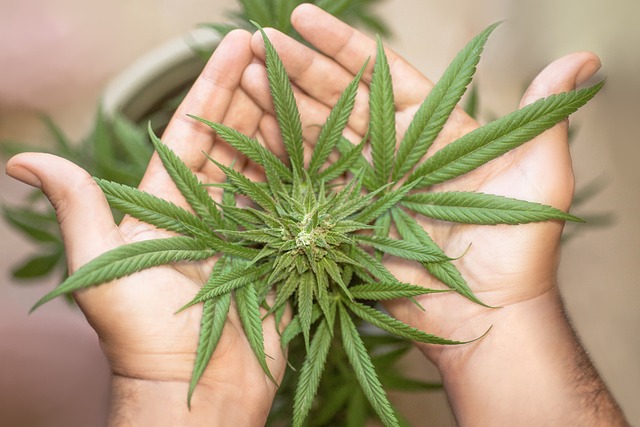THCA (Tetrahydrocannabinolic Acid), a non-psychoactive cannabinoid found in cannabis and legal in Colorado, is gaining research attention for its potential therapeutic benefits, including anti-inflammatory and neuroprotective properties. Studies are investigating its use in treating conditions like arthritis, neuropathy, multiple sclerosis, and epilepsy due to its analgesic and possible neuroprotective effects. Colorado's progressive cannabis laws, such as Amendment 64, have created a regulated environment for both research and practical use of THCA, allowing individuals to explore its benefits through various methods like vaporizing or consuming edibles. Ongoing studies are set to uncover additional applications for this cannabinoid. Colorado's legal framework, which includes the sale and use of THCA flowers, ensures quality and safety, making it a hub for medical and recreational cannabis applications. The state's diverse THCA flower strains with unique terpene profiles offer different therapeutic experiences, establishing Colorado as a leader in cannabis research and innovation, particularly in the exploration of THCA's medicinal properties.
Discover the transformative potential of THCA flowers, a cannabinoid-rich botanical gaining recognition for its therapeutic properties. Delve into how these legally available substances in Colorado contribute to wellness and health, setting the stage for an enlightening exploration of their benefits and legal status within the state’s progressive framework. Join us as we unravel the science behind THCA and its impact on health, all within the context of Colorado’s evolving cannabis landscape.
- THCA Flower Benefits Unveiled: A Closer Look at THCA Legal in Colorado
- Exploring the Therapeutic Properties and Legal Status of THCA Flowers in Colorado
THCA Flower Benefits Unveiled: A Closer Look at THCA Legal in Colorado

In the realm of cannabinoid research, THCA, or Tetrahydrocannabinolic Acid, has garnered attention for its potential wellness benefits. As it stands, THCA is legal in Colorado, allowing residents and visitors to explore its properties within a regulated framework. THCA is the non-psychoactive precursor to THC, the primary psychoactive component of cannabis. Unlike THC, THCA is known for its anti-inflammatory and neuroprotective qualities, making it an object of interest in various therapeutic applications. Preliminary studies suggest that THCA may help alleviate symptoms associated with conditions such as arthritis and neuropathy due to its analgesic effects. Additionally, there is a growing body of evidence indicating that THCA could offer neuroprotective benefits, potentially aiding in the treatment of neurodegenerative diseases like multiple sclerosis and epilepsy. Its legal status in Colorado provides an accessible platform for researchers and users to study and experience its benefits firsthand, contributing valuable insights into its potential applications in health and wellness.
The unique position of THCA as a non-intoxicating compound allows individuals to benefit from its properties without the psychoactive effects associated with other cannabinoids. In Colorado, where THCA is legal, enthusiasts and patients alike can partake in products specifically designed to preserve its integrity, such as THCA flowers. These flowers are often vaporized or infused into edibles, offering a wide range of therapeutic options for those seeking natural relief from various ailments. The scientific community continues to explore the full spectrum of THCA’s benefits, with ongoing research potentially uncovering new uses and applications for this cannabinoid. As such, Colorado’s progressive stance on cannabis legislation has not only paved the way for innovative research but also provided a safe environment for individuals to engage with these emergent wellness options.
Exploring the Therapeutic Properties and Legal Status of THCA Flowers in Colorado

In recent years, THCA flowers have garnered attention for their potential therapeutic properties, particularly within the context of medical and recreational cannabis use in Colorado. Tetrahydrocannabinolic acid (THCA) is the raw, non-psychoactive precursor to Delta-9-THC, the primary psychoactive component found in cannabis. As THCA legal in Colorado, researchers have been exploring its benefits, which include anti-inflammatory, anti-nausea, anti-anxiety, and potential neuroprotective effects. These flowers are often preferred for their high THCA content and are utilized by individuals seeking the medicinal properties of cannabis without the intoxicating effects associated with THC. The state’s progressive stance on cannabis has facilitated a robust market for these products, allowing consumers to legally access THCA flowers for various wellness applications.
The legal status of THCA flowers in Colorado is defined by the state’s Amendment 64 and subsequent regulations that legalized recreational cannabis use in 2012, followed by the Medicinal and Recreational Cannabis Regulations. These legal frameworks dictate that adult residents and visitors can legally purchase and possess THCA flowers from licensed dispensaries. The Colorado Department of Public Health and Environment oversees the production and sale of these products, ensuring they meet stringent quality and safety standards. As such, consumers in Colorado have access to a variety of THCA flower strains, each with its unique terpene profile that can offer distinct therapeutic experiences. This legal access has made Colorado a hub for cannabis research and innovation, further contributing to the understanding and utilization of THCA flowers’ medicinal benefits.
THCA flower, a non-psychoactive cannabinoid found abundantly in hemp and certain strains of cannabis, has garnered attention for its potential health benefits. As the legal landscape evolves, particularly in Colorado where it’s fully compliant with state laws, consumers are increasingly exploring its therapeutic properties. The insights gathered from scientific research and user experiences indicate promising wellness applications for THCA, highlighting its role as a natural alternative for those seeking relief or improved health outcomes without the mind-altering effects of THC. As this cannabinoid continues to gain traction, it’s clear that ongoing studies will further elucidate its benefits, potentially expanding its use and recognition within the wellness community, particularly in Colorado where its legality paves the way for innovation and accessibility.
